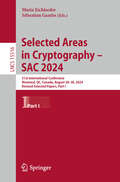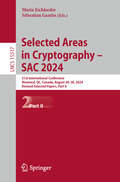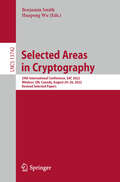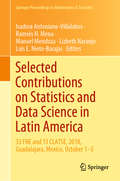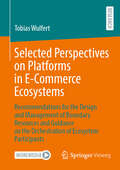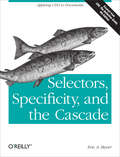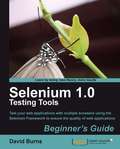- Table View
- List View
Selected Areas in Cryptography – SAC 2023: 30th International Conference, Fredericton, Canada, August 14–18, 2023, Revised Selected Papers (Lecture Notes in Computer Science #14201)
by Claude Carlet Vincent Rijmen Kalikinkar MandalThis book contains revised selected papers from the 30th International Conference on Selected Areas in Cryptography, SAC 2023, held in Fredericton, New Brunswick, Canada, in August 2023.The 21full papers presented in these proceedings were carefully reviewed and selected from 45 submissions. The papers are organized in the following topical sections: Cryptanalysis of Lightweight Ciphers; Side-Channel Attacks and Countermeasures; Post-Quantum Constructions; Symmetric cryptography and fault attacks; Post-Quantum Analysis and Implementations; Homomorphic encryption; Public-Key Cryptography; and Differential Cryptanalysis.
Selected Areas in Cryptography – SAC 2024: 31st International Conference, Montreal, QC, Canada, August 28–30, 2024, Revised Selected Papers, Part I (Lecture Notes in Computer Science #15516)
by Maria Eichlseder Sébastien GambsThis two-volume set LNCS 15516-15517 contains revised selected papers from the 31st International Conference on Selected Areas in Cryptography, SAC 2024, held in Montreal, QC, Canada, in August 2024. The 25 full papers presented in these proceedings were carefully reviewed and selected from 95 submissions. The papers are organized in the following topical sections: Part I: Privacy-preserving cryptography; post-quantum cryptography; attacks on public-key cryptography; and identity-based encryption. Part II: Authenticated encryption; symmetric design strategies; cryptanalysis of arithmetization-oriented primitives; symmetric primitive design; and implementations and side-channel analysis.
Selected Areas in Cryptography – SAC 2024: 31st International Conference, Montreal, QC, Canada, August 28–30, 2024, Revised Selected Papers, Part II (Lecture Notes in Computer Science #15517)
by Maria Eichlseder Sébastien GambsThis two-volume set LNCS 15516-15517 contains revised selected papers from the 31st International Conference on Selected Areas in Cryptography, SAC 2024, held in Montreal, QC, Canada, in August 2024. The 25 full papers presented in these proceedings were carefully reviewed and selected from 95 submissions. The papers are organized in the following topical sections: Part I: Privacy-preserving cryptography; post-quantum cryptography; attacks on public-key cryptography; and identity-based encryption. Part II: Authenticated encryption; symmetric design strategies; cryptanalysis of arithmetization-oriented primitives; symmetric primitive design; and implementations and side-channel analysis.
Selected Areas in Cryptography: 27th International Conference, Halifax, NS, Canada (Virtual Event), October 21-23, 2020, Revised Selected Papers (Lecture Notes in Computer Science #12804)
by Orr Dunkelman Michael J. Jacobson Jr. Colin O’FlynnThis book contains revised selected papers from the 27th International Conference on Selected Areas in Cryptography, SAC 2020, held in Halifax, Nova Scotia, Canada in October 2020. The 27 full papers presented in this volume were carefully reviewed and selected from 52 submissions. They cover the following research areas: design and analysis of symmetric key primitives and cryptosystems, including block and stream ciphers, hash functions, MAC algorithms, and authenticated encryption schemes, efficient implementations of symmetric and public key algorithms, mathematical and algorithmic aspects of applied cryptology, and secure elections and related cryptographic constructions
Selected Areas in Cryptography: 28th International Conference, Virtual Event, September 29 – October 1, 2021, Revised Selected Papers (Lecture Notes in Computer Science #13203)
by Riham AlTawy Andreas HülsingThis book contains revised selected papers from the 28th International Conference on Selected Areas in Cryptography, SAC 2021, held as a virtual event September and October 2021.* The 23 full papers presented in this volume were carefully reviewed and selected from 60 submissions. They cover the following research areas: design and analysis of symmetric key primitives and cryptosystems, including block and stream ciphers, hash functions, MAC algorithms, and authenticated encryption schemes, efficient implementations of symmetric and public key algorithms, mathematical and algorithmic aspects of applied cryptology, and secure elections and related cryptographic constructions. *The conference was originally planned to take place at the University of Victoria, BC, Canada. Due to the COVID-19 pandemic, it was held virtually.
Selected Areas in Cryptography: 29th International Conference, SAC 2022, Windsor, ON, Canada, August 24–26, 2022, Revised Selected Papers (Lecture Notes in Computer Science #13742)
by Benjamin Smith Huapeng WuThis book constitutes the refereed post-conference proceedings of the 29th International Conference on Selected Areas in Cryptography, SAC 2022, held in Windsor, Canada, during August 24–26, 2022. The 21 full papers presented in this volume were carefully reviewed and selected from 53 submissions. The papers are categorized into the following topical sections: lattices and ECC; differential cryptanalysis; cryptographic primitives; isogeny-based cryptography I; block ciphers; differential cryptanalysis II; isogeny-based cryptography II; and protocols and PRFs.
Selected Articles from the International Conference on Sustainable Fashion and Technical Textiles: ICSFT-2024: 12 November, Jalandhar, India (Proceedings in Technology Transfer)
by Ashish Kapoor Payal Bansal Sudev Dutta C. C. Reddy Prabhuraj VenkatramanThis book includes peer reviewed articles from ICSFT-2024 held on 12 November at Jalandhar in India. It highlights the future of eco-friendly fashion and the development of advanced textile technologies and practices to reduce the environmental impact of fashion industry. It encompasses the creation and application of new materials, production processes, and design strategies that prioritize sustainability, resource efficiency, and reduced waste. It highlights the integration of eco-friendly practices in textile manufacturing, such as the use of biodegradable fibers, recycled materials, and sustainable dyeing techniques, aiming to transform the fashion industry into a more environmentally responsible sector while maintaining high performance and functionality in textiles. By highlighting successful case studies and emerging trends, the book provides a comprehensive overview of how sustainability is being integrated into the technical textiles sector. Perfect for professionals, researchers, and enthusiasts, this resource underscores the importance of sustainability in creating a more responsible and environmentally friendly fashion landscape.
Selected Articles from the Smart and Sustainable Industrial Ecosystem Conference 2024: SSIEC 2024, 5 August, Kuala Lumpur, Malaysia (Proceedings in Technology Transfer)
by Akhil Garg Christina Chin M. M. Novita Sakundarini Andrew SpowageThis book presents selected peer reviewed articles from the Smart and Sustainable Industrial Ecosystem Conference 2024 (SSIEC 2024), that took place on 5 August 2024in The Kuala Lumpur Teaching Centre, Kuala Lumpur, Malaysia. The collection catered for articles sharing new insights and research developments by academicians and industry experts on the theme that aligns with United Nations SGD 9 (build resilient infrastructure, promote inclusive and sustainable industrialization and foster innovation) and 11 (make cities and human settlements inclusive, safe, resilient, and sustainable). Topics covered include renewable energy systems, advanced sustainable materials technologies, energy-efficient process and mechanical systems, smart manufacturing, and green and sustainable manufacturing. The book will appeal to sustainable energy consultants, mechanical and manufacturing engineers.
Selected Contributions of 2024 2nd International Conference on Electric Vehicle and Vehicle Engineering (Lecture Notes in Electrical Engineering #1424)
by Jun Xu Pak Kin WongThis book presents an extensive exploration of the latest trends in Electric Vehicle and the boundless opportunities they offer. It has encompassed various facets including Intelligent Vehicle, Electric Vehicle Technology, Power Electronics and Motor Drives, Energy Systems and Storage, Electronic Control Systems, Battery Technologies, Autonomous and Connected Vehicles. The book is tailored for researchers, engineers, and practitioners deeply involved in the field of Electric Vehicle. It delves into the intricate technicalities of EV technology, providing profound insights and comprehensive discussions on its fundamental principles.
Selected Contributions on Statistics and Data Science in Latin America: 33 FNE and 13 CLATSE, 2018, Guadalajara, Mexico, October 1−5 (Springer Proceedings in Mathematics & Statistics #301)
by Ramsés H. Mena Isadora Antoniano-Villalobos Manuel Mendoza Lizbeth Naranjo Luis E. Nieto-BarajasThe volume includes a collection of peer-reviewed contributions from among those presented at the main conference organized yearly by the Mexican Statistical Association (AME) and every two years by a Latin-American Confederation of Statistical Societies. For the 2018 edition, particular attention was placed on the analysis of highly complex or large data sets, which have come to be known as “big data”. Statistical research in Latin America is prolific and research networks span within and outside the region. The goal of this volume is to provide access to selected works from Latin-American collaborators and their research networks to a wider audience. New methodological advances, motivated in part by the challenges of a data-driven world and the Latin American context, will be of interest to academics and practitioners around the world.
Selected Papers from the 10th International Conference on E-Business and Applications 2024
by Pui Mun Lee Gyu Myoung LeeThis book brings together original, peer-reviewed research papers from the 2024 10th International Conference on E-Business and Applications, held in Singapore from February 26 to 28, 2024. The papers delve into AI-enabled business innovation, data-driven value creation, and the emerging IoT landscape, providing in-depth insights into these rapidly evolving fields. The book bridges the gap between business intelligence, artificial intelligence, and e-commerce trading technologies, offering a holistic perspective on the intersection of these disciplines. Readers can gain valuable knowledge through real-world examples, data visualization techniques, and business analytics applications, enhancing their understanding of how these concepts translate into tangible business outcomes.
Selected Perspectives on Platforms in E-Commerce Ecosystems: Recommendations for the Design and Management of Boundary Resources and Guidance on the Orchestration of Ecosystem Participants
by Tobias WulfertDigital platforms hold significant economic value, enriching various industry sectors. While they are pivotal in driving value creation and capture, it is not solely their technological prowess that underpins their economic significance. Rather, their effectiveness lies in their integration within business ecosystems. In this study, Tobias Wulfert examines digital platforms in the context of e-commerce through five lenses: · Enterprise architecture · Boundary resources · Application lifecycle · Dynamic capabilities · Value creation This analysis focuses on different e-commerce platform types, developing an architectural framework and a taxonomy for classification. The author also delineates e-commerce ecosystem architectures, emphasizing the role of platforms as central components and the involvement of peripheral ecosystem participants. He explores boundary resources as crucial interfaces between platforms and ecosystem participants. He further suggests a reference procedure model for the management of these boundary resources. Furthermore, he delves into the dynamic capabilities necessary for effective ecosystem orchestration, identifying configurations of dynamic capabilities that can confer sustainable competitive advantages.
Selected Proceedings from the 2nd International Conference on Intelligent Manufacturing and Robotics, ICIMR 2024, 22-23 August, Suzhou, China: Advances in Intelligent Manufacturing and Robotics (Lecture Notes in Networks and Systems #1316)
by Fan Zhang Wei Chen Long Huang Anwar PP Abdul Majeed Andrew Huey Ping Tan Yuyao Yan Yang Luo Chenguang Liu Yuyi ZhuThis book presents proceedings from the 2nd International Conference on Intelligent Manufacturing and Robotics, ICIMR 2024 Held on 22 and 23 August in Suzhou, China. This proceedings deliberates on the key challenges, engineering and scientific discoveries, innovations, and advances on intelligent manufacturing and robotics that are non-trivial through the lens of Industry 4.0. In this book, traditional and modern solutions that are employed across the spectrum of various intelligent manufacturing and robotics contexts are presents. The readers are expected to gain an insightful view on the current trends, issues, mitigating factors as well as proposed solutions from this book.
Selected Reflections in Language, Logic, and Information: ESSLLI 2019, ESSLLI 2020 and ESSLLI 2021 Student Sessions, Selected Papers (Lecture Notes in Computer Science #14354)
by Raffaella Bernardi Alexandra Pavlova Mina Young PedersenThe European Summer School in Logic, Language and Information (ESSLLI) is organized every year by the Association for Logic, Language and Information (FoLLI) in different sites around Europe. The papers cover vastly dierent topics, but each fall in the intersection of the three primary topics of ESSLLI: Logic, Language and Computation. The 13 papers presented in this volume have been selected among 81 submitted papers over the years 2019, 2020 and 2021. The ESSLLI Student Session is an excellent venue for students to present their work and receive valuable feedback from renowned experts in their respective fields. The Student Session accepts submissions for three different tracks: Language and Computation (LaCo), Logic and Computation (LoCo), and Logic and Language (LoLa).
Selected Studies in Geotechnics, Geo-informatics and Remote Sensing: Proceedings of the 3rd Conference of the Arabian Journal of Geosciences (CAJG-3) (Advances in Science, Technology & Innovation)
by Jasper Knight Sandeep Panda Broder Merkel Stefan Grab Sami Khomsi Amjad Kallel Haroun Chenchouni Murat Karakus Mehdi Eshagh Helder I. Chaminé Maurizio Barbieri Hesham El-Askary Jesús Rodrigo-Comino Ali Cemal Benim Zeynal Abiddin Ergüler Riheb Hadji Mourad BezzeghoudThis book contains the best papers accepted for presentation at the 3rd Springer Conference of the Arabian Journal of Geosciences (CAJG-3). The book is divided into three parts to distinguish research studies from the fields of (1) geological and geotechnical engineering, (2) geomechanical studies based on numerical and analytical methods, and (3) geo-informatics and remote sensing. The content of these papers provides new scientific knowledge for further understanding on landslides, new stabilization techniques, importance of geophysics for engineering geology investigations as well as new empirical approaches for easily predicting some physical and hydrogeomechanical properties of geomaterials. It also sheds the light on usage of different remote sensing technologies, mapping techniques in a geographic information systems environment along with some advanced signal processing, and deep learning approaches. The book is of interest to all researchers, practitioners, and students in the fields of geological and mining engineering, geotechnical engineering, hydrogeomechanics, engineering geology, geotechnologies, groundwater and natural hazards, and analyses of some emerging earth processes and environmental variabilities.
Selected Unsolved Problems in Coding Theory (Applied and Numerical Harmonic Analysis)
by Jon-Lark Kim David JoynerUsing an original mode of presentation, and emphasizing the computational nature of the subject, this book explores a number of the unsolved problems that still exist in coding theory. A well-established and highly relevant branch of mathematics, the theory of error-correcting codes is concerned with reliably transmitting data over a 'noisy' channel. Despite frequent use in a range of contexts, the subject still contains interesting unsolved problems that have resisted solution by some of the most prominent mathematicians of recent decades. Employing Sage--a free open-source mathematics software system--to illustrate ideas, this book is intended for graduate students and researchers in algebraic coding theory. The work may be used as supplementary reading material in a graduate course on coding theory or for self-study.
Selectors, Specificity, and the Cascade: Applying CSS3 to Documents
by Eric A. MeyerExactly how does the "cascade" in Cascading Style Sheets work? This concise guide demonstrates the power and simplicity of CSS selectors for applying style rules to different web page elements. You’ll learn how your page’s presentation depends on a multitude of style rules and the complex ways they function—and sometimes collide—within the document’s structure.This guide is a chapter from the upcoming fourth edition of CSS: The Definitive Guide. When you purchase either the print or the ebook edition of Selectors, Specificity, and the Cascade, you’ll receive a significant discount on the entire Definitive Guide when it’s released. Why wait when you can learn how to use selectors and other key CSS 3 features right away?Learn how to create CSS rules that apply to a large number of similar elementsGroup rules to make style sheets smaller and download times fasterUnderstand how elements inherit styles from their parentsDiscover how reader and browser preferences affect your page presentationExamine specificity—the method browsers use to choose between two conflicting style rulesGet a handle on how specificity and inheritance combine to form the cascadeGet details on all of the CSS3 selectors
Selenium 1.0 Testing Tools: Beginner’s Guide
by David BurnsWritten with a fast-paced but friendly and engaging approach, this Packt Beginner's Guide is designed to be placed alongside the computer as your guide and mentor. Step-by-step tutorials are bolstered by explanations of the reasoning behind what you are doing. You will quickly pick up the necessary skills, tips, and tricks for creating successful tests for your web applications with practical examples that help you to learn by experiment and play.If you are a Software quality assurance professional, software project manager, or software developer interested in developing automated testing in web based applications, then this book is definitely for you.
Selenium 2 Testing Tools: Beginner’s Guide
by David BurnsThis book is written in Beginner's Guide style which emphasizes the concept of learning by doing. The book is packed with examples and code so that you can get the best out of this book. If you are a Software Quality Assurance professional, Software Project Manager, or a Software Developer interested in automated testing using Selenium, this book is for you. Web-based application developers will also benefit from this book.
Selenium Design Patterns and Best Practices
by Dima KovalenkoWhether you are an experienced WebDriver developer or someone who was newly assigned a task to create automated tests, this book is for you. Since the ideas and concepts are described in simple terms, no previous experience in computer coding or programming is required.
Selenium Essentials
by Prashanth SamsIf you are a developer who wants to migrate from Selenium RC or any other automation tool to Selenium WebDriver, then this book is for you. Knowledge of automation tools is necessary to follow the examples in this book.
Selenium Framework Design in Data-Driven Testing: Build data-driven test frameworks using Selenium WebDriver, AppiumDriver, Java, and TestNG
by Carl Cocchiaro Pinakin Ashok ChaubalTake a deep dive into building data-driven test frameworks using Selenium WebDriver Key Features A comprehensive guide to designing data-driven test frameworks using the Selenium 3 WebDriver API, AppiumDriver API, Java-Bindings, and TestNG Learn how to use Selenium Page Object Design Patterns and D.R.Y. (Don’t Repeat Yourself) Approaches to software development in automated testing Discover the Selenium Grid Architecture and build your own grid for browser and mobile devices Use third party tools and services like ExtentReports for results processing, reporting, and SauceLabs for cloud-based test services Book Description The Selenium WebDriver 3.x Technology is an open source API available to test both Browser and Mobile applications. It is completely platform independent in that tests built for one browser or mobile device, will also work on all other browsers and mobile devices. Selenium supports all major development languages which allow it to be tied directly into the technology used to develop the applications. This guide will provide a step-by-step approach to designing and building a data-driven test framework using Selenium WebDriver, Java, and TestNG. The book starts off by introducing users to the Selenium Page Object Design Patterns and D.R.Y Approaches to Software Development. In doing so, it covers designing and building a Selenium WebDriver framework that supports both Browser and Mobile Devices. It will lead the user through a journey of architecting their own framework with a scalable driver class, Java utility classes, JSON Data Provider, Data-Driven Test Classes, and support for third party tools and plugins. Users will learn how to design and build a Selenium Grid from scratch to allow the framework to scale and support different browsers, mobile devices, versions, and platforms, and how they can leverage third party grids in the Cloud like SauceLabs. Other topics covered include designing abstract base and sub-classes, inheritance, dual-driver support, parallel testing, testing multi-branded applications, best practices for using locators, and data encapsulation. Finally, you will be presented with a sample fully-functional framework to get them up and running with the Selenium WebDriver for browser testing. By the end of the book, you will be able to design your own automation testing framework and perform data-driven testing with Selenium WebDriver. What you will learn Design the Selenium Driver Class for local, remote, and third party grid support Build Page Object Classes using the Selenium Page Object Model Develop Data-Driven Test Classes using the TestNG framework Encapsulate Data using the JSON Protocol Build a Selenium Grid for RemoteWebDriver Testing Construct Utility Classes for use in Synchronization, File I/O, Reporting and Test Listener Classes Run the sample framework and see the benefits of a live data-driven framework in real-time Who this book is for This book is intended for software quality assurance/testing professionals, software project managers, or software developers with prior experience in using Selenium and Java to test web-based applications.This book is geared towards the quality assurance and development professionals responsible for designing and building enterprise-based testing frameworks.The user should have a working knowledge of the Java, TestNG, and Selenium technologies
Selenium Fundamentals: Speed up your internal testing by automating user interaction with browsers and web applications
by Diego MolinaDiscover how to use Selenium to efficiently test your own applications.Key FeaturesUnderstand the importance of automation with real-world examplesExplore each and every path from configuring an environment to automation with Selenium GridMaster the core concepts of Selenium with 40 exercises and 20 activitiesBook DescriptionThere are several challenges while writing automated tests for web applications: you have to select an adequate test framework, use appropriate selectors to avoid flaky tests, and build a good testing framework. Selenium Fundamentals helps you tackle these challenges and provides you with the knowledge to overcome hurdles in testing by developing stable and effective testing solutions. You’ll learn the complete process of automated testing, such as configuring your environment, creating and running automated tests, analyzing reports, and troubleshooting errors by using a Selenium Grid.To start with, you’ll understand the importance of automating tests. You’ll then move on to understanding how to choose the best selectors for navigating through your web applications while highlighting best practices and techniques.After writing your first tests, you’ll cover the object model to create your own advanced test cases. You’ll analyze a test report, track timing errors, and separate real issues from flaky tests. In addition to this, you’ll learn how to configure and connect to a local grid, a network grid, and a third-party service.By the end of the book, you will have the skills you need to run automated tests on your own web applications.What you will learnGet an overview of SeleniumIdentify what to automate in a project and configure the environmentControl browser behavior and manipulate web page elementsUnderstand the nuances of writing tests and creating test suitesCreate UI tests with Selenium WebDriver and analyze test resultsTroubleshoot errors in automation and build meaningful reportingWho this book is forSelenium Fundamentals is designed for you if you are a software quality assurance and development professional who wants to learn how to automate browser activity and web-based user interface tests with Selenium.
Selenium Testing Tools Cookbook
by Unmesh GundechaThis is a cookbook packed with code examples and step-by-step instructions to ease your learning curve. This book is intended for software quality assurance/testing professionals, software project managers, or software developers with prior experience in using Selenium and Java for testing web-based applications. This book also provides examples for C#, Python, and Ruby users.
Selenium Testing Tools Cookbook - Second Edition
by Unmesh GundechaOver 90 recipes to help you build and run automated tests for your web applications with Selenium WebDriverAbout This BookLearn to leverage the power of Selenium WebDriver with simple examples that illustrate real-world problems and their workaroundsExplains the testing of mobile applications with Appium for mobile platforms such as iOS and AndroidA pragmatic manual with engaging recipes and attractive screenshots to test your web applications efficientlyWho This Book Is ForThis book is intended for software quality assurance/testing professionals, software project managers, or software developers with prior experience in using Selenium and Java to test web-based applications. This books also provides examples for C#, Python and Ruby users.What You Will LearnUnderstand how the locators work and use various locator methods to build reliable testsBuild reliable and maintainable tests with the Selenium WebDriver APIUse the PageFactory pattern to build a robust and easy to maintain test frameworkBuild data-driven tests and extend Selenium API to implement custom steps and checksIntegrate and use ATDD/BDD tools such as Cucumber, SpecFlow, Capybara, and Behave with the Selenium WebDriver APISet up iPhone/iPad and Android simulators and devices to test your mobile web application with AppiumSet up Selenium Grid for faster and parallel running of tests, increasing test coverage and reducing test execution time for cross-browser testingBuild extended Selenium WebDriver tests for additional coverageIn DetailThis book is an incremental guide that will help you learn and use the advanced features of the Selenium toolset including the WebDriver API in various situations to build a reliable test automation. You start off by setting up the test development environment and gain tips on the advanced locater strategy and the effective use of the Selenium WebDriver API.After that, the use of design patterns such as data - driven tests and PageFactory are demonstrated. You will then be familiarised with extending Selenium WebDriver API by implementing custom tasks and setting up your own distributed environment to run tests in parallel for cross-browser testing.Finally, we give you some tips on integrating Selenium WebDriver with other popular tools and testing mobile applications. By the end of this book, you will have learned enough to solve complex testing issues on your own.Style and approachThis recipe-based guide covers real-life scenarios of testing your web apps with Selenium. Each recipe begins with a short introduction and key concepts along with illustrated examples of use cases, and ends with detailed but informative descriptions of the inner workings of the example.

